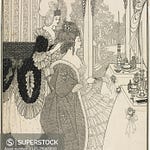It’s often been noted that there weren’t a lot of great stage plays written in English in the nineteenth century. I'm not sure why that was so, but I do know this — it is the great age of a new form of poetry called the “dramatic monologue,” and that Tennyson and Browning were the masters of it. We’ve had one already in our Poem of the Week, Browning’s “Soliloquy of the Spanish Cloister.” The monologue this week may be his most famous of all, “My Last Duchess.”
The scene is perfect for irony upon irony, for suggesting more than you say, and maybe even threatening more than you say. Imagine a party downstairs, in the castle of an Italian duke who has a fine old name, much land, a lot of great art, and not as much current money as he would like. He is a widower, and he wants to marry — and he wants the goods that will come with it. But he is particular as to what kind of woman would be fit to be his duchess. He has his eye on the daughter of a nearby Count, a man evidently richer than he is. And he wants to make sure that everyone knows beforehand how his new duchess is expected to behave. So he shows the Count’s representative a beautiful portrait of his former duchess, his “last duchess,” and, as if it were just by way of making small talk, he tells the representative what was wrong with that beautiful and gracious young lady.
Do we believe him? How did his last duchess die? What can we know for certain? Would you trade your daughter and a good sum of money for the title of “duchess,” if she were to marry this man? What exactly is going on?
That’s my last Duchess painted on the wall, Looking as if she were alive. I call That piece a wonder, now; Frà Pandolf’s hands Worked busily a day, and there she stands. Will 't please you sit and look at her? I said “Frà Pandolf” by design, for never read Strangers like you that pictured countenance, The depth and passion of its earnest glance, But to myself they turned (since none puts by The curtain I have drawn for you, but I) And seemed as they would ask me, if they durst, How such a glance came there; so, not the first Are you to turn and ask thus. Sir, ‘twas not Her husband’s presence only, called that spot Of joy into the Duchess’ cheek: perhaps Frà Pandolf chanced to say “Her mantle laps Over my lady’s wrist too much,” or “Paint Must never hope to reproduce the faint Half-flush that dies along her throat”: such stuff Was courtesy, she thought, and cause enough For calling up that spot of joy. She had A heart—how shall I say?—too soon made glad, Too easily impressed; she liked whate’er She looked on, and her looks went everywhere. Sir, ‘twas all one! My favor at her breast, The dropping of the daylight in the West, The bough of cherries some officious fool Broke in the orchard for her, the white mule She rode with round the terrace—all and each Would draw from her alike the approving speech, Or blush, at least. She thanked men—good! but thanked Somehow—I know not how—as if she ranked My gift of a nine-hundred-years-old name With anybody’s gift. Who’d stoop to blame This sort of trifling? Even had you skill In speech—(which I have not)—to make your will Quite clear to such an one, and say, “Just this Or that in you disgusts me; here you miss, Or there exceed the mark”—and if she let Herself be lessoned so, nor plainly set Her wits to yours, forsooth, and made excuse --E’en then would be some stooping; and I choose Never to stoop. Oh sir, she smiled, no doubt, Whene’er I passed her; but who passed without Much the same smile? This grew; I gave commands; Then all smiles stopped together. There she stands As if alive. Will ‘t please you rise? We’ll meet The company below, then. I repeat, The Count your master’s known munificence Is ample warrant that no just pretense Of mine for dowry will be disallowed; Though his fair daughter’s self, as I avowed At starting, is my object. Nay, we’ll go Together down, sir. Notice Neptune, though, Taming a sea horse, thought a rarity, Which Claus of Innsbruck cast in bronze for me!













Share this post